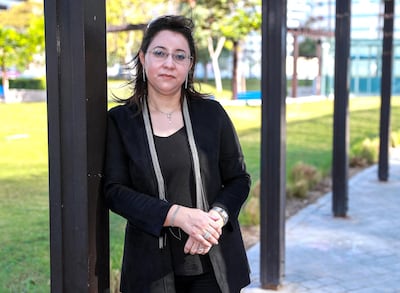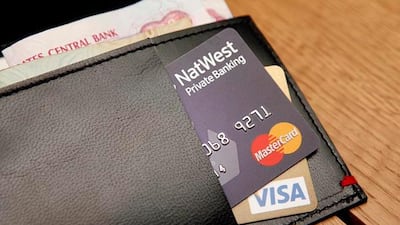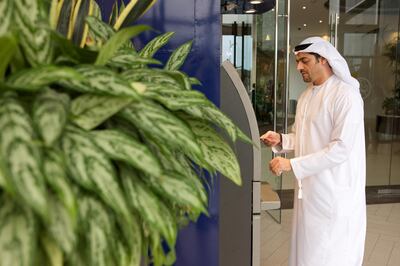Emiratis struggling with debt have got help thanks to a free financial literacy programme.
In a virtual ceremony, on Sunday more than 50 participants graduated from the first community-run course, called Ghaya, which means 'inspirational goal' in Arabic.
Two-thirds of attendees were referred by the Social Support Authority, the safety net programme developed by the Abu Dhabi government for Emiratis who are unemployed, in debt, and need support from the state.
Fifteen people signed up independently.
Salama Al Ameemi, director general of the Ma'an, Abu Dhabi's Authority for Social Contribution, said the classes were a lifeline for people who had fallen into financial trouble.
"There are women who are, for example, living in remote areas, and they didn't get a job yet, or there are a woman who used to be married and they got divorced and now they want to know how to handle their finances,” she said.
“Even people with a lot of money can get into bad debt, to the point that they need such a programme.
“Unless you are employed, and you have a source of an income, then you cannot be classified as rich,” she added.
According to a 2019 financial literacy survey by Visa, 43 per cent of people in the UAE aged between 16 and 24 said they were not ready to manage their own money. And 53 per cent said schools did not prepare them enough to take care of their own finances.
The average UAE resident was in debt to the tune of Dh42,571 ($11,590), according a 2017 report by what was then National Bank of Abu Dhabi (NBAD). Financial troubles caused by the Covid-19 pandemic means that number could rise increase.
As in many countries, the pinch point for young Emiratis comes when they graduate and start their first job. As soon as they have a salary, banks offer them credit cards and personal loans, and they start to build up debt.
As a consequence, by the time they get married and move out from home they are already struggling to service interest repayments.
Munther Mohammed Saif, 34, signed up for the three-month programme because he had issues with personal debt.
“I have learned how to manage my loans and how to pay them off, and also what type of insurance policies I should have for my car and my home,” said the father of two, who got into debt before he got married, and did not want reveal how much he had borrowed.
“I have seen many people who got a new job, and in the first year they bought a very luxury car, and other very unnecessary things.
“So this needs to be thought about before one even goes to the workplace and starts getting a monthly salary,” he added.
Ali Husain Alkhoori, 29 said he signed up after hearing about the course through his friends.
“There are a lot of Emiratis struggling with their finances. A lot of people get in debt for unnecessary lifestyle [items], like cars or buying a new home, or some are getting debts for travelling,” he said.
“They always want to go business or first class when they can't afford it. But they go and get a loan from the banks and they do it.”
Unlike many of the other students, he did not have any legacy debt problems, but wanted to learn how to become financially independent.
“We learned how to invest your money, how to buy the shares, how to sell, and how to get the profits by the end of the year,” he explained.
Setting financial goals
The classes took place on Sunday evenings and lasted up to two hours. Tuition was virtual, and students participated in lectures and group activities online.

All the teachers were volunteers, and the initiative was designed and financed through a partnership between the Abu Dhabi Global Market Academy and the London Institute of Banking and Finance.
The classes covered a range of financial literacy topics such as how to save and live within your means and how to identify suitable investment options.
Hajer Zarrouki is an assistant professor at Higher College of Technology in Abu Dhabi. She tutored one group of students, who were mostly aged between 30 and 40.
“We taught them how to understand the difference between wants and needs, how to set financial goals, and how to accomplish these goals efficiently and in a short period of time,” she said.
“The way people spend money is not related to how much they have, because everything is relative.
“Spending more than you are receiving is a kind of behaviour, and you can change that,” she added.
Relentless rise of personal debt
The government has sought to improve financial responsibility in recent years.
Around 1,607 Emiratis were exempted from paying debts worth Dh869.8m in November last year, as per directives of the President, Sheikh Khalifa. Twelve banks were part of the scheme, which was put together by the UAE's Citizens' Debt Settlement Fund.
Over the last three years, the UAE has introduced several programmes to deal with the problem of rising personal debt. In 2020, the Central Bank of the UAE signed an agreement with Emirates Foundation to launch a financial literacy programme through the Esref Sah scheme.
The next Ghaya course is due to start in the next few months.
Mr Saif said the classes have helped him find financial peace of mind.
“The lessons directly helped me with my finances. I feel relief, and confident I can achieve my goals for this year and the future,” he added.







